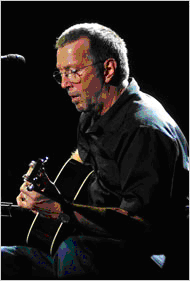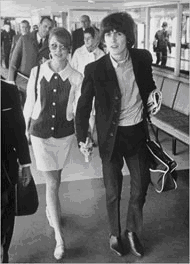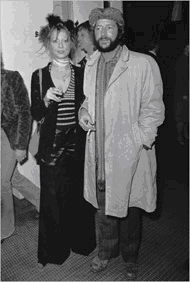 |
| Eric Clapton has written his autobiography. |
It is one of the most mythic romantic entanglements in rock ’n’ roll history. At some point in the late 1960s, Eric Clapton fell in love with Pattie Boyd, wife of his close friend George Harrison. Mr. Clapton’s 1970 masterpiece, “Layla and Other Assorted Love Songs” (recorded with his band at the time, Derek and the Dominos), was an offering and a plea to her; they eventually married in 1979 and divorced in 1988.
 |
| Eric Clapton has written his autobiography. |
 |
| Mr. Clapton’s ex-wife, Pattie
Boyd, with her first husband, George Harrison, in 1966. |
The saga sits at the center of “Clapton: The Autobiography,” which is being published this week by Broadway Books. Mr. Clapton’s memoir follows the recent release of Ms. Boyd’s side of the story in “Wonderful Tonight” (named for a song he wrote about her), which in September entered the New York Times best-seller list at No. 1. Mr. Clapton said that he had not read her book but that he had seen excerpts in newspapers and noted discrepancies, both small and large, between the two accounts of their relationship.
On the phone from his home outside London, where he lives with his wife, Melia McEnery, and their three daughters, he singled out as far-fetched Ms. Boyd’s description of a night in which he and Mr. Harrison had a “guitar duel” for her hand. “We each have our different versions of our years together,” he said.
His description of his relationship with Ms. Boyd, though, offers few excuses for his emotional swings, substance abuse and extramarital affairs (including one that produced his oldest daughter) that defined much of their decade together. “Someone recently read the book and told me that I was really hard on myself,” Mr. Clapton said. ”I think that’s a misunderstanding of it. I just tried to take responsibility for all the different phases of my life.”
There is now a long tradition of rock biographies, usually the more lurid, the better. But as the luminaries of rock get older, they are beginning to write their own histories. The autobiographies of Bob Dylan and Sting have been best sellers in recent years, this fall will see the publication of books by Ron Wood and Slash, and Keith Richards recently received a contract for more than $7 million for his life story.
“Clapton” chronicles the many musical configurations of Mr. Clapton’s career. He has played in several monumental bands (the Yardbirds, Cream); accompanied giants from the Beatles and Bob Dylan to Muddy Waters and Howlin’ Wolf; and topped the charts and filled arenas as a solo performer. (An accompanying two-CD retrospective, “Complete Clapton,” is also being released this week.)
With his sturdy blues foundation, liquid tone and architecturally structured solos, Mr. Clapton, 62, is one of rock’s most influential and revered guitarists. Early in his career, the scrawled phrase “Clapton is God” was a common sight on the walls of London.
But Mr. Clapton’s life has also been defined by a series of tragedies and oddities. He was raised by his grandparents, under the illusion that they were his parents; he never met his father and, until the age of 9, believed that his mother was actually his older sister. He suffered through a lengthy, epic battle with alcoholism and drug addiction. In 1991, Mr. Clapton’s 4-year-old son, Conor, died after falling out of a hotel room window (inspiring one of his most popular songs, “Tears in Heaven”).
“I wanted to wait until I had an entire life to write about,” he said. “And though I don’t think I’m quite done yet, my memory was starting to play tricks on me. I realized that if I didn’t do it now, I might have to rely on other people’s memories, and it might start to lose some of the accuracy.”
Unlike some of his peers, though, Mr. Clapton
has long been known as extremely private and press-shy. He said that he had
thought about writing his memoirs for a long time, though always at the
prompting of others.
He first attempted the conventional process for a celebrity memoir, with the use
of a ghostwriter: Christopher Sykes, a longtime friend. But Mr. Clapton was
unhappy with this version. “It looked very defensive, judgmental, full of
self-justification,” he said. “It just looked dreadful.”
Charlie Conrad, Mr. Clapton’s editor, acknowledged that the early drafts were “a bit breathless.” He said, however, that even at that stage, “we were fully satisfied; we were actually surprised at how frank and forthcoming it was, but he felt it wasn’t truly him.”
So in the midst of a worldwide tour last winter, Mr. Clapton — who, in the book, describes himself as both lazy and a perfectionist — took over the writing himself. He put himself on a disciplined schedule, working in “self-imposed exile” in his hotel room every morning and afternoon.
“I found that I couldn’t wait to pick up the thread each time,” he said. “I really enjoyed doing it; it was really fun to learn how to put a sentence and a paragraph together.”
What is most striking about the result is the author’s distinctly measured tone, which never becomes hysterical or sentimental, even when writing about painful, dramatic or unflattering situations. (“I considered all of my previous irrational behavior to have been reasonably excusable,” he writes, fairly late in the story, “because it had been conducted with consenting adults.”) In at least one case, though, his voice was a cause for concern from his editors.
 |
| Ms Boyd with Mr. Clapton in 1975. |
“They called me up and wanted to know why I was so detached about the loss of my son,” Mr. Clapton said. “I had to explain that it was impossible to re-enter that period of time. It’s so traumatic that I can really only talk about it from a distance, as if it were about someone else.” In the book, he writes that when he got the news, he “stepped back within himself” and then entered “a permanent daze.”
He added that it wasn’t a matter of being unable to summon his feelings. “It’s not difficult to revisit. The sadness is always there, it taps me on the shoulder and all comes flooding back. But it is difficult to write about it without sensationalizing it or falsely creating an emotional standpoint just because that’s what’s expected.”
Mr. Conrad said that both he and the book’s editor in Britain found the chapter about Conor’s death “kind of restrained” but ultimately accepted it. “We suggested that he might explore it in more depth, but he gave us what he wanted to say.”
The biggest curiosity for readers, however, presumably surrounds his account of his marriage to Ms. Boyd. Her book incited a bit of a tabloid frenzy, particularly a scene of the two guitarists battling for her affection with their instruments like medieval knights.
Mr. Clapton remembers the evening in question. “I went over just to hang out, he got two guitars, and we played,” he said. “But we were always doing that, so how do you make an everyday thing into a commodity?”
Ms. Boyd said in an e-mail message that she and Mr. Clapton are “friends” now but that he “is quite right in saying that we each have our memories of our years together.”
Despite his anguish over his initially unrequited love, which drove him deeper into addiction, Mr. Clapton says now that the affair didn’t seem like such a big deal. “At the time it was kind of like swinging, very loose and amoral,” he said. “I think we didn’t give it too much thought. It was really only later that we realized that we treated each other quite badly.”
The despair of “Layla,” Mr. Clapton added, represented a creative choice, not a documentary about his life. “That’s the art of writing love songs,” he said. “I was desperately obsessed with Pattie, but creating a song is just putting a stamp on a feeling.”
Ms. Boyd has different feelings about the intensity of their affair. “It was a big deal,” she wrote. “Eric was very attractive and persuasive. George and I had many problems in our relationship that had a great deal to do with the enormity of his fame and his increasing passion for meditation and the spiritual life. He frequently simply wasn’t there for me, and there were other women.”
Mr. Clapton’s friendship with Mr. Harrison survived the change in Ms. Boyd’s allegiance; famously, the former Beatle once said, “I’d rather she be with him than some dope.” Mr. Clapton served as the musical director for the “Concert for George” tribute show after Mr. Harrison’s death from cancer in 2001.
“For George, it was all maya,” he said, referring to the Hindu concept of cosmic illusion. “Something would come up, and we would get together to play because that’s what drew us together. His take was purely spiritual, that we could always get past the physical world.”
Ms. Boyd’s summation is that “George was able to put all of this in perspective.”
If Mr. Clapton sounds at peace with his complicated personal history, what emerges as he recounts his musical career in his autobiography is a kind of perpetual dissatisfaction. In one telling anecdote, he remembers coveting a certain guitar when he was young, only to lose interest after buying it. “As soon as I got it, I suddenly didn’t want it anymore,” he writes. “This phenomenon was to rear its head throughout my life and cause many difficulties.”
Mr. Clapton comes across as feeling equally uneasy as a frontman and as part of a band. He tells of joining and quitting groups, no matter how successful, frequently and with little warning. He races dismissively through his solo albums from the 1970s (which he described in conversation as “unfulfilled and half-baked”). Most recently, he seems happiest collaborating with old friends like B. B. King or the reclusive songwriter J. J. Cale; he is exploring possibilities with Steve Winwood, his partner in the ill-fated supergroup Blind Faith.
“My musical identity has taken my entire life to develop,” Mr. Clapton said. “Now I can sing in a band, play backup, lead, sing a duet — there doesn’t have to be a label on it anymore. The most important thing is that I enjoy listening to music, and I still do.”
Mr. Clapton said he finds his stability in the blues, the music that he first loved and that he continues to regard as a kind of beacon. “There’s a matter-of-factness, a sense of acceptance about the blues,” he said. “Acceptance is a great state of being. It steps aside of hysteria, drama, extreme emotions.” And it is precisely this even, unblinking sensibility that defines the author’s voice in “Clapton.”
“To write this book, I had to be comfortable with my day-to-day existence,” Mr. Clapton said. “I like that I can look back and feel comfortable with my life.